- Home
- Harlan Ellison
The Glass Teat - essays of opinion on the subject of television
The Glass Teat - essays of opinion on the subject of television Read online
* * * *
The Glass Teat
Essays of opinion on the subject of television
By Harlan Ellison
Scanned & Proofed By MadMaxAU
* * * *
HARLAN ELLISON is a recognized novelist, critic and film/tv scenarist with extensive credits. He has written scripts for such motion pictures as The Oscar, Khadim, Swing Low, Sweet Harriet and the as-yet-unproduced Harlan Ellison’s Movie. In television he has written for such series as “The Outer limits,” “Burke’s Law,” “Star Trek,” “Circle of Fear,” “The Young Lawyers,” “The Man from U.N.C.L.E.” and many others. He is the only writer in the 26-year history of the Hollywood Writers Guild of America awards to win that recognition from his peers three times. He created the short-lived NBC-syndicated series, “The Starlost,” and though Ms original script of the pilot segment won the WGA award, its rewritten and aired version was so corrupted, he walked away from his own series at a personal cost to himself of $93,000. He has been a member of the Board of Directors of the Writers Guild and has published fiction and film/ tv criticism in Esquire, Show, Cinema, New Times» Playboy, Cosmopolitan, Eye and the American Film Institute Report. He is a frequent college lecturer and is well-known in the field of imaginative literature. A film adaptation of his award-winning novella, “A Boy and His Dog,” has recently been released as an independant production, starring Jason Robards and Don Johnson. His latest books are DEATHBIRD STORIES and APPROACHING OBLIVION. In 1975-76, Pyramid will publish eighteen of Mr. Ellison’s books.
Pyramid edition published February 1975
ISBN 0-515-03701-X
* * * *
NEW INTRODUCTION
The Glass Teat Revisited:
A Supplementary Introduction / 1975
Now that Dick and Spiro and all their ghoul errand-boys are gone, you can read this book again.
I’m not much one for conspiracy theories—I’m not that paranoid yet but I’m getting there, I’m getting there—and so you’ll understand that I’m telling you nothing but the flat truth when I explain that Agnew and his minions scuttled this book the first time around, in 1970. I’ll even tell you how it happened, who to ask for verification that I’m not making it all up, and how it happens that THE GLASS TEAT got a second chance...thereby proving I’ve been storing up some good karma.
As you’ll read in the introduction to the original edition of this collection of essays (it follows immediately hereafter), I started writing my television column for the Los Angeles Free Press in late 1968. I wrote the column every week for two and a half years; enough copy to fill two books of essays. The first was
this one, published by Ace Books in 1970 as THE GLASS TEAT. The other book, with the balance of the columns, was to be published by Ace in 1971 as THE OTHER GLASS TEAT. Second book never got born; and in that story lie the seeds of verification for everything I’ve set down in this book . . . everything about the rapacity and need to stifle criticism of Nixon’s reign, that is. I’m wrong about a few things— like the nobility of youth, frinstance—but then, even God made a few mistakes. Otherwise how do you explain poison ivy, tsunamis and Donald Segretti?
As best I can make it (and getting cold-fact substantiation of the sequence of events was like trying to screw fog), here’s what happened:
Ace released the original version of this book in March of 1970. It was their leader. Nice promotion, nice package, a lightweight pr trip during which I covered the major markets in the West and on the East Coast. The column was still running in the Free Press and I was hyping the book through that medium, as well. Reviews started coming in. Excellent reviews. Several hundred of them, not a downer in the batch. Cronkite mentioned the book, Cecil Smith in the LA Times did an entire column on it, college newspapers picked up on it and said it was the best down-home look at tv ever published; lotta that kind of ego-buildup.
The publisher was overjoyed. Terry Carr, then an editor at Ace, the man who’d first decided to publish the book, felt vindicated; John Waxman (now a v-p at Ace but at the time the head of publicity and promotion) kept a box of the books under his office desk so he could fill special requests on the spot; several colleges ordered large quantities and adopted the book for their “media” classes.
Preliminary reports from the field, after two months, showed an incredible ninety per cent sale on the first print run of 88,565 copies. Ace started talking about going back to press for another one hundred thousand copies, just in case we had hold of something that was taking off. Terry approached me for a second book, on instructions from the Ace higher-ups: “Sign him up for the sequel before the book hits so big he demands more money.”
On August 10th, 1970 I signed the contracts for THE OTHER GLASS TEAT, for four thousand dollars advance, same as I’d gotten on THE GLASS TEAT. And I kept on writing my columns, saying what I had to say about the condition of life in these here now United States, as viewed through the lens of television. Merely waiting till I hit column number 104 so the second book would be the same size as the first.
Then, suddenly, everything turned into a nightmare!
A friend called from Sacramento to tell me I’d been placed on Ronald Reagan’s “subversives list.” Dig it: this was four years before we were to learn of “enemies lists” via the Watergate route, though such lists undoubtedly existed at that time. My name was one of several hundred on a semi-public document being circulated out of the California state capital, ostensibly setting out guidelines for colleges and universities who hired guest lecturers. There I was with Abbie Hoffman and Dave Dellinger and Jane Fonda and other Commie-Symp radicals like John Ciardi and Dick Gregory. People our dear Unca’ Ronnie would frown upon being solicited to come and talk; the hook was, of course, that state funds might be withheld at budget time the following year, from institutions that chose to ignore this friendly suggestion. It wasn’t exactly a blacklist, just don’t breathe too deeply, y’know what I mean?
That was the first indication I had that maybe my big fat typewriter had gotten me in deep stuff with the shadowy Them who took as a concomitant of power sneaky panther games we’ve come to know and love so well as brought to a fine Machiavellian art by King Richard the Phlebitten. What I didn’t know at that moment in time was that Spiro had been shown a copy of the book by someone on his staff, and had taken direct offense to a wayward line I’d written about him. What line? Uh, er...
“Spiro Agnew masturbates with copies of The Reader’s Digest.”
Uh, heh heh. All in, er, uh, good fun, Spiro . . . see, I was just trying to make a smartass reference to your oneness with the Common Man in America during that period, your homey-ness, your commonality of roots with Middle America, your utter sexlessness, your purity, your squeaky cleanliness. Not a mean thought in my bones, Spiro, honest to God.
Would you believe, gentle readers, Spiro took that line as a personal slur. Simply no pleasing some people!
I should have gotten the wind up when the rotten letters started coming in. From the Kiwanis in Florissant, Missouri. From the American Nazi party in El Monte, California. From the American Legion in Harrodsburg, Kansas. From a bailing wire salesman in a motel in Talihina, Oklahoma. From my mother in Miami Beach, Florida.
And Ace’s running ads for the book in college newspapers, with the banner headline AGNEW’S ANSWER! didn’t do much to help.
So there I sat with two grand of Ace’s money, just shucking and jiving, writing my columns, heading toward the 104th installment of “The Glass Teat” column, at which point I’d Xerox up the lot from installment #53 to installmen
t #104, fire it off to Terry Carr in New York, and collect my remaining two grand advance money. But it didn’t work that way.
One day Terry called me. Now I’ve known Terry for close on twenty years, ever since we were both sf fans. He’s a tall, mostly quiet guy with an impeccable sense of decorum and restraint. Good editor, nice man, patience of Job. Can’t even remember seeing him angry or demonstrably troubled, even when he was. Called me. Troubled. Heard it in his voice.
“Hi, Terry, what’s up?”
“Got some bad news for you.”
“Krakatoa isn’t ‘East of Java’?!”
“Serious.”
“Okay, sorry. What is it?”
“We’re not doing THE OTHER GLASS TEAT.”
(Long silence.) (Fighting for breath.) (Battle won.)
“Don’t fuck around with me, man; it’s been a meat-grinder of a day.”
“I’m not kidding.”
“Well, shit, Terry! You’ve gotta be kidding because the damned book is selling ninety per cent of its print run, so what the hell is the story?”
“I don’t know. I got the word from the front office. The returns are starting to come in. By the carloads. Some of the distributors aren’t even just tearing off the covers and sending them back; they’re sending back the whole damned book, boxes of them, most of them unopened, more every day, like they were plague carriers.”
I sat stunned. What the effulgent hell was happening!?!
Well, it Was true. John Waxman called a week or so later and advised me the warehouse was filling up with return of THE GLASS TEAT. No explanations, no whys&wherefores, just thousands of copies bouncing back from all over America faster than the Night of the Lepus. By December 30th, 1970, what had looked like a sellout of the 88,565 copy print run turned out to be a total sale of 36,304. Don’t ask me what per cent that was; I was too stunned to know or care.
It didn’t make sense. I’d gotten a call from a friend who worked in the offices of Marboro, one of the biggest chain booksellers in New York. THE GLASS TEAT had been their non-fiction leader for three solid weeks; they couldn’t get enough copies to stay in stock. And I knew for a fact that here in Los Angeles the damned book was moving faster than a Tijuana breakfast.
Terry called back a few days later and said Ace had told him to tell me I could keep the two thousand dollars I’d already received as first half of the advance. Just let them out of the contract for THE OTHER GLASS TEAT. Book was mine, no claims, I could do what I wanted with it. Now, if you have ever had any dealings with Ace—world-renowned as the biggest thugs since Boss Tweed and a publisher known to hang onto a property unto the ninth generation—you will perceive my shock and stunned disbelief. They just wanted rid of me and that sequel.
So. What had happened, as best I’ve been able to piece it together since 1970, by asking discreet questions of people now four-years’ removed from the situation and somewhat less under pressure, was that the word had come down from what John Dean likes to call “the highest offices in the land” that THE GLASS TEAT was a seditious, Communistic, mind-polluting snare of verbiage promulgated by elements bent on the violent overthrow of the Miss America Pageant, Let’s Make a Deal, Monday Night NFL Football, Matt Dillon and, not incidentally, the United States of America as personified by the mouth that walked like a man, Spiro T. Agnew.
Distributors, newsdealers, wholesalers and retailers, all got the clear but surreptitious message: this book ain’t for sale. Not nowhere, not nohow, not no way!
And Ace took a bath on the book.
And when they found out what was behind it, they jumped out of the contract for THE OTHER GLASS TEAT with sighs of relief that they’d only lost two grand, and not their lives.
So for the next four years THE GLASS TEAT— which had sold enormously well on either Coast, where all you radical swine congregate, polluting the precious bodily fluids of Amurrrica—began to acquire something of an underground reputation. I received hundreds of letters from college students and teachers who were using the book in their classes, handing around one dog-eared copy because they couldn’t find others, dog-eared or otherwise. Reviews continued appearing, all of them admiring. And here’s a little photo-extract from the Journal of Popular Culture just to prove I haven’t been dreaming all of this.
And now, 1975, THE GLASS TEAT is back. As the first in Pyramid Books’ series of Ellison reissues and new titles. The first in the series because the letters still keep coming from people who want to know where they can buy a copy. Because the things said in this book, even though ostensibly concerned with tv programs most of which have been off-the-air for the last four years, still pertain. The subtexts are still current. Doesn’t matter if we’re talking about Mission: Impossible or Cannon, The Beverly Hillbillies or The Little House on the Prairie, The Brady Bunch or Born Free. The names change, but the banality remains. If you’ve caught samples of this season’s fare, you know damned well I could be writing about network slops from the early Devonian Age and still have it all dead-on. ,
Only it’s seven years since I started writing those first fumbling Free Press observations about television and nothing much has happened. Nothing much except:
• Agnew and Nixon proved all the warnings I trumpeted about their evil were accurate.
• Agnew and Nixon succeeded in crushing the spirit of the rebellious Sixties, smoothing the way for the deadhead Seventies.
• The networks have grown more frightened and restrictive.
• The audience-testing methods and de facto blacklists of actors, directors and writers have become firmly entrenched.
• Almost all genuine creative talents have fled the medium.
• Middle class mediocrity and law’n’order programming have become the rule.
• We’re all seven years older and not one scintilla wiser.
So here comes THE GLASS TEAT again. To be read as a slice of your recent past. To serve as a stock-taker. And if it doesn’t suffice, get ready for the month of May, 1975 when Pyramid will risk the wrath of the Gods and publish—for the first time anywhere, in glorious black and white, 52 wonderful columns 52— THE OTHER GLASS TEAT!
I suggest you buy it and hide it. Because, unless something strange and wonderful happens between the time I write this (5:54 pm, 14 September 75) and the time you buy this book, and Nixon kicks off, he’ll still be alive and can always make a comeback. Don’t laugh. We thought the crazy sonofabitch was politically dead when we wouldn’t elect him Governor of California in 1962.
Which brings me to a freaky idea. A weekly situation comedy about a nutso politician who actually committed suicide in 1960, resucitated by voodoo, who keeps coming back to life every four years, a zombie, and keeps getting elected by all the nerds and gits who forget how creepy he was last time around. Now let’s see, who’ll we get to play the politician?
How about Reagan?
Nah. Type-casting never works.
Anyhow, I’ll see you in May. Maybe.
—Harlan Ellison
* * * *
23” WORTH OF INTRODUCTION
If you believe that “all the news that’s fit to print” is what you’ll find in The New York Times, and if you believe all the news they find fit to print, chances run good you’ve never stumbled across my column of television criticism. “The Glass Teat” appears weekly (when I’m not off in the Great American Heartland gathering source material) in the liveliest underground newspaper in the United States, The Los Angeles Free Press. (Known to friends and bomb-throwing right-wingers alike as “The Freep.”)
It has been running for a year and a half, approximately, as you buy this book. It has netted for me piles of abusive, threatening letters, some critical praise from men in the Industry whom I respect—such as Walter Cronkite, Joseph Stefano, Christopher Knopf, and several other familiar newscasters who’d rather I didn’t use their names—damned little financial return, an assurance from ABC that my scripts are no longer welcome at that network, two attempts on m
y life that didn’t come nearly close enough, an ill-deserved reputation in the subculture as a guy over thirty who can be trusted, and a forum from which to express my fears and sorrows about the way we’re fucking up this country.
Oh, yes, by the way: I occasionally use profanity.
But, you see, that’s one of the lovely things about the Freep. You can say what you want to say, in the way you want to say it. That’s sort of de rigueur with the underground press. Despite its frequent lapses into bad taste and paranoia, it has become the last bastion of genuinely free journalistic speech in America. Though frequently denied press credentials accorded to any other legitimate news medium (which sometimes makes for muddiness in the reportage due to subcutaneous sources of information), the underground press persists in presenting the other side of the news we are daily fed through TV, radio and newspapers via “official sources” and the spokesmen of the Establishment.
How this column came to be is a short story to tell, and I do not think you will revile me overmuch for taking the time here to tell it.

 Repent, Harlequin! Said the Ticktockman
Repent, Harlequin! Said the Ticktockman Broken Glass
Broken Glass Other Glass Teat
Other Glass Teat Memos From Purgatory
Memos From Purgatory I Have No Mouth and I Must Scream
I Have No Mouth and I Must Scream The Deadly Streets
The Deadly Streets The Glass Teat
The Glass Teat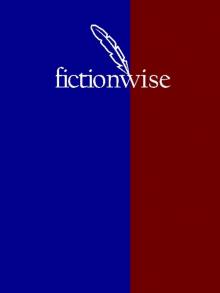 Paingod and Other Delusions
Paingod and Other Delusions No Doors No Windows
No Doors No Windows Strange Wine
Strange Wine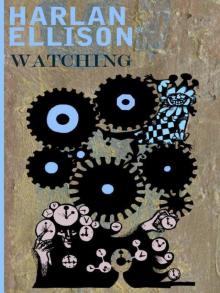 Harlan Ellison's Watching
Harlan Ellison's Watching Over the Edge/An Edge in My Voice
Over the Edge/An Edge in My Voice Troublemakers: Stories by Harlan Ellison
Troublemakers: Stories by Harlan Ellison Gentleman Junkie and Other Stories of the Hung-Up Generation
Gentleman Junkie and Other Stories of the Hung-Up Generation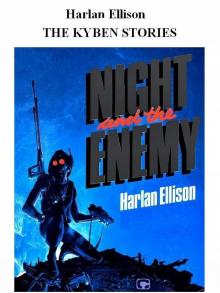 The Kyben Stories
The Kyben Stories From the Land of Fear
From the Land of Fear The Top of the Volcano: The Award-Winning Stories of Harlan Ellison
The Top of the Volcano: The Award-Winning Stories of Harlan Ellison Sleepless Nights in the Procrustean Bed
Sleepless Nights in the Procrustean Bed Ellison Wonderland
Ellison Wonderland Children of the Streets
Children of the Streets Can & Can'tankerous
Can & Can'tankerous Love Ain't Nothing but Sex Misspelled
Love Ain't Nothing but Sex Misspelled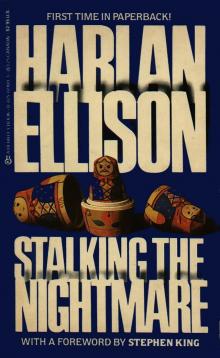 Stalking the Nightmare
Stalking the Nightmare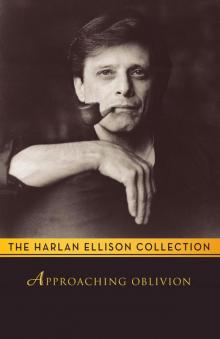 Approaching Oblivion
Approaching Oblivion Deathbird Stories
Deathbird Stories Partners in Wonder
Partners in Wonder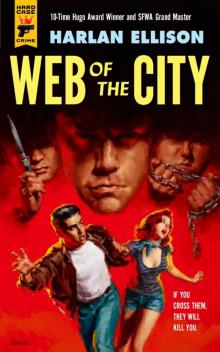 Web of the City
Web of the City Spider Kiss
Spider Kiss A Boy and His Dog
A Boy and His Dog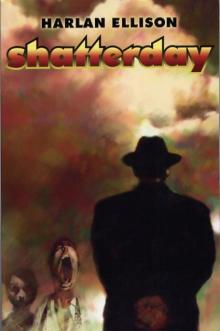 Shatterday
Shatterday Slippage: Previously Uncollected, Precariously Poised Stories
Slippage: Previously Uncollected, Precariously Poised Stories Repent, Harlequin! Said the Ticktockman
Repent, Harlequin! Said the Ticktockman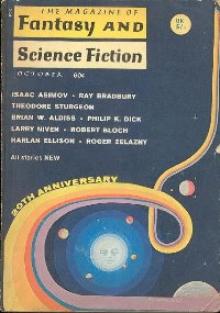 Come to Me Not in Winter's White
Come to Me Not in Winter's White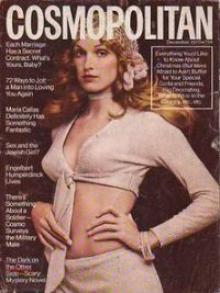 The Song the Zombie Sang
The Song the Zombie Sang The Other Glass Teat
The Other Glass Teat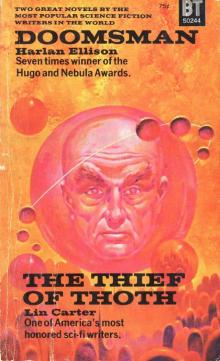 Doomsman - the Theif of Thoth
Doomsman - the Theif of Thoth The City on the Edge of Forever
The City on the Edge of Forever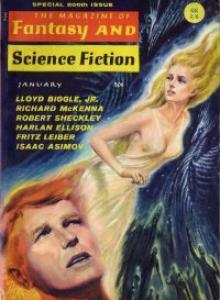 I See a Man Sitting on a Chair, and the Chair Is Biting His Leg
I See a Man Sitting on a Chair, and the Chair Is Biting His Leg The Harlan Ellison Hornbook
The Harlan Ellison Hornbook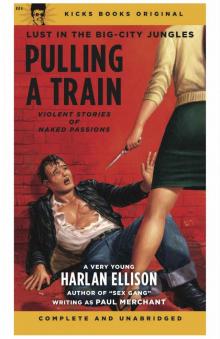 Pulling A Train
Pulling A Train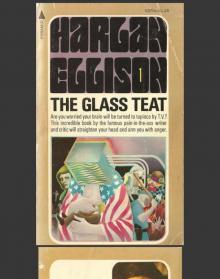 The Glass Teat - essays of opinion on the subject of television
The Glass Teat - essays of opinion on the subject of television An Edge in My Voice
An Edge in My Voice Angry Candy
Angry Candy Troublemakers
Troublemakers The Top of the Volcano
The Top of the Volcano Over the Edge
Over the Edge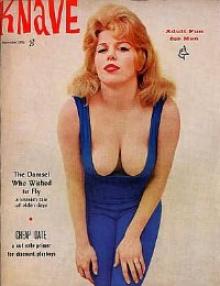 Survivor #1
Survivor #1 Slippage
Slippage